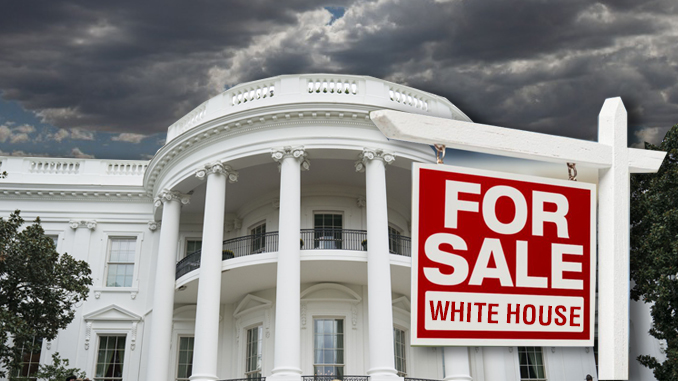
Reporter explains how rise of billionaire politicians is threatening our republic.
By S.T. Patrick
When former New York City mayor Mike Bloomberg entered the Democratic race for the party’s presidential candidacy, the already-affluent race for the White House became even more lush. The race included a pair of billionaires—Bloomberg and hedge fund manager Tom Steyer (both now out of the race)—and others who have made a bulk of their income from the government (or from taxpayers, more specifically). But what does immense wealth buy you in a presidential campaign? How far into the late summer can it push a campaign? In short, can a billionaire candidate really buy the White House?
A recent article on the “Business Insider” website addressed the net worth of the Democratic field. Bloomberg’s net worth is listed at $64.2 billion. The figures are estimates, as they are combinations of disclosures and assets. Elizabeth Warren, who dropped out of the race on March 5, is worth between $4.6 and $10.6 million ($12 million including her husband), Joe and Jill Biden are worth around $9 million, and Bernie Sanders tops out at $2 million ($2.5 million with his wife Jane included). Amy Klobuchar and husband John Bessler’s worth is estimated at close to $2 million. (Klobuchar dropped out of the race on March 2.) That is where the billionaire and millionaire club ends. At the bottom end of the list is Hawaii Rep. Tulsi Gabbard, whose comparably modest wealth is estimated between $300,000 and $500,000.
Being a president is an instant path to wealth itself. The Obamas are now worth 30 times as much as they were when they entered the White House in January 2009, now estimated at $40 million. In his first year out of office, Bill Clinton earned $13.7 million from giving 57 speeches. When Hillary Clinton ran in 2016, her estimated net worth was $45 million. The office not only holds an inherent power and respect; it is the starting line to a lifetime of fantastic living. Yet, can wealth get you there?
Literally, no, a candidate cannot buy the White House or even a party’s nomination directly. It can buy advertising, but most viable candidates have enough political action committee (PAC) support to blanket television and radio with ads for over a year. What Bloomberg has done in 2020, however, is unprecedented. Ad spending for the 2020 campaigns has now topped $1 billion. Bloomberg, in 2020 alone, has accounted for over $500 million of that in television, print, and digital advertising. Tom Steyer was second with $210 million in advertising. Biden is third with $14.3 million. While historical studies show that advertising works, it is difficult to quantify the level at which a dollar amount spent equals one extra vote.
WHAT MONEY CAN BUY
What Bloomberg’s money has bought him outside of Madison Avenue is where the true power of the purse lies. Through Bloomberg Philanthropies, the former mayor has pumped $100 million into midterm campaigns for Democrats, 15 of 21 of whom were women. He has also spent $350 million on grants to 196 of the most energetic, emerging cities in America. In turn, more than 100 mayors have endorsed his campaign. Three California mayors went through Bloomberg’s Harvard City Leadership Initiative, a program set up to train new mayors. London Breed, San Francisco’s first black female mayor, graduated from the program and now endorses Bloomberg’s campaign. She has on multiple occasions been tasked with defending his notorious stop-and-frisk program.
In recent years, Bloomberg has spent over $10 billion on charitable and political causes. In return, he has built a team of supporters who have received funds from his philanthropic efforts. From non-profits that benefitted from Bloomberg Philanthropies (and hope to keep benefitting in the future) to politicians whose city’s pet programs have been funded by the former mayor of America’s largest city, Bloomberg has spent years buying key supporters in the country’s most densely populated markets. The Democratic politicians he has funded, the newest members of the House of Representatives as well as the mayors of some of the most left-wing cities along both coasts, are now in his camp. That becomes infinitely important when they all convene in July as superdelegates to the Democratic National Convention in Milwaukee.
Those who support a candidate spending his or her own money on a political campaign always charge freedom of speech. An American should be able to spend as much as they desire to campaign for a job, they argue. Yet, when political support is at the end of the open palm, it extraordinarily weights the power of a campaign in favor of those with massive personal wealth. It’s true that the office originated with one of America’s richest men, George Washington, and it has always been an office that your average laborer could not attain. But what the Democratic Party has done is to structure an electoral process that favors influence peddling of the politically entrenched and excessively wealthy.
S.T. Patrick holds degrees in both journalism and social studies education. He spent 10 years as an educator and now hosts the “Midnight Writer News Show.” His email is [email protected]. He is also an occasional contributor to TBR history magazine and the current managing editor of Deep Truth Journal (DTJ), a new conspiracy-focused publication available from the AFP Online Store.






